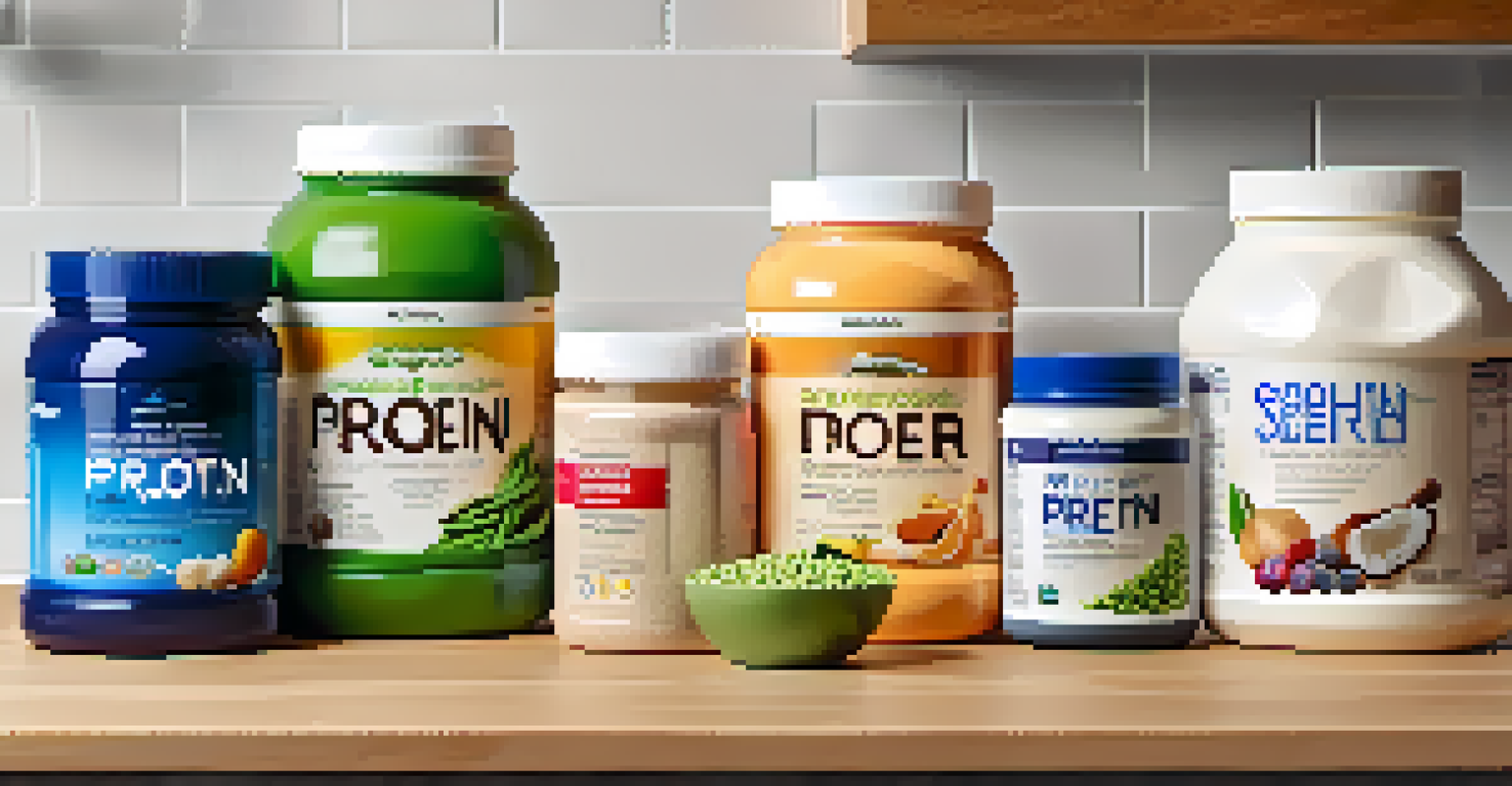Protein Supplements for Vegetarians: Choosing the Right Ones

Understanding Protein Needs for Vegetarians
Protein is a vital nutrient that helps build and repair tissues, and it's essential for everyone, including vegetarians. While meat is a common protein source, vegetarians must find alternatives that meet their dietary needs. The recommended dietary allowance (RDA) for protein is about 46 grams for women and 56 grams for men, but this can vary based on activity levels and age.
Let food be thy medicine and medicine be thy food.
For vegetarians, it's crucial to incorporate a variety of protein sources to ensure they get all the essential amino acids. These amino acids are the building blocks of protein, and while some plant proteins are incomplete, combining different sources can provide a complete profile. For example, pairing beans with rice or nuts with whole grains can enhance protein intake effectively.
Understanding your protein requirements and sources is the first step towards selecting the right supplements. This ensures that you’re not only meeting your protein needs but also enjoying a balanced diet rich in nutrients.
Types of Protein Supplements Available
When it comes to protein supplements, vegetarians have a plethora of options to choose from. The most common types include whey, casein, soy, and pea protein. Whey and casein are dairy-based, while soy and pea are plant-based, making them suitable for vegetarian diets.

Soy protein is a complete protein, meaning it contains all the essential amino acids that the body cannot produce on its own. Pea protein, on the other hand, is gaining popularity due to its digestibility and high iron content. Both are excellent choices for those looking to boost their protein intake without animal products.
Protein Sources for Vegetarians
Vegetarians need to incorporate a variety of protein sources to ensure they obtain all essential amino acids.
Understanding the types of protein supplements available can help you make informed decisions. Each type has its unique benefits and can fit different dietary preferences and needs.
Evaluating Protein Quality and Digestibility
Not all protein supplements are created equal, and it's essential to assess their quality and digestibility. The Protein Digestibility Corrected Amino Acid Score (PDCAAS) is a common measure used to evaluate protein quality. A higher PDCAAS value indicates better protein quality, which is crucial for muscle growth and recovery.
The food you eat can be either the safest and most powerful form of medicine or the slowest form of poison.
For vegetarians, soy protein typically scores high on this scale, making it a great option. Pea protein also scores well, providing good quality without the allergens associated with soy or dairy. This is particularly beneficial for individuals with food sensitivities or allergies.
Choosing a protein supplement that not only fits your dietary restrictions but also offers high quality and digestibility will maximize your nutritional benefits and support your health goals.
Considerations When Choosing Protein Supplements
When selecting a protein supplement, there are several factors to consider, including dietary restrictions, taste preferences, and any allergies. For instance, if you're lactose intolerant, whey protein might not be the best choice for you. Instead, you might opt for a plant-based protein like pea or brown rice.
It's also important to consider the flavor and texture of the supplement. Some protein powders can have a chalky taste or gritty texture, which might be unappealing. Sampling different brands or choosing unflavored options can help you find one that suits your palate.
Choosing Quality Protein Supplements
Evaluating protein quality through measures like PDCAAS helps vegetarians select supplements that support their health goals.
Ultimately, personal preferences and dietary needs should guide your choice of protein supplements to ensure you enjoy your nutrition regimen.
How to Incorporate Protein Supplements into Your Diet
Incorporating protein supplements into your diet doesn't have to be complicated. They can be added to smoothies, oatmeal, or even baked goods for an extra protein boost. For example, blending protein powder with fruits and almond milk can create a delicious and nutritious breakfast smoothie.
You can also mix protein powder into yogurt or sprinkle it over salads for added texture and nutrition. This versatility makes it easy to include protein supplements in your daily meals without feeling like you're forcing it.
Finding creative ways to incorporate protein supplements into your diet will not only enhance your nutrition but also keep your meals enjoyable.
Potential Side Effects of Protein Supplements
While protein supplements can be beneficial, they are not without potential side effects. Some individuals may experience digestive issues, such as bloating or gas, especially if they consume too much protein too quickly. It’s essential to start with smaller servings and gradually increase to assess your body’s tolerance.
Additionally, some protein powders may contain added sugars or artificial ingredients that can hinder your health goals. Always check the ingredient list and choose products with minimal additives for a cleaner supplement.
Consult a Nutritionist for Guidance
Consulting with a nutritionist provides personalized advice on protein intake and overall dietary balance for optimal health.
Being aware of potential side effects can help you make informed decisions and ensure that you’re using protein supplements effectively and safely.
Consulting with a Nutritionist for Personalized Advice
If you're unsure about which protein supplements to choose or how to incorporate them into your diet, consulting with a nutritionist can be incredibly beneficial. They can provide personalized advice based on your dietary preferences, health goals, and lifestyle. This tailored approach ensures that you're not just guessing which products will work for you.
A nutritionist can also help you understand how to balance your protein intake with other essential nutrients. They can guide you in creating a well-rounded meal plan that meets all your dietary needs, which is particularly important for vegetarians who may be missing certain nutrients.

Getting professional guidance can empower you to make informed decisions about your nutrition, leading to better health outcomes and overall well-being.